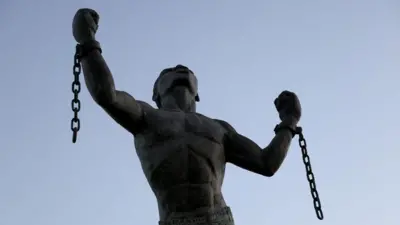We've updated our Privacy and Cookies Policy
We've made some important changes to our Privacy and Cookies Policy and we want you to know what this means for you and your data.
The deserving or undeserving poor?
Can the welfare state ever distinguish between those who deserve help and those who do not, asks the ΒιΆΉΤΌΕΔ's Chris Bowlby.
If you're asked for money on the street, do you make an instant judgement about whether the payment's deserved?
Relieving poverty has always been about much more than handing out money. Morality always lurks in the background. And that kind of moral judgement is also present in the current welfare reform debate.
Cabinet minister Jeremy Hunt attracted much attention for suggesting the state shouldn't support large families receiving more in benefit than the average wage.
The Archbishop of Canterbury, meanwhile, warned that people often need welfare "not because they're wicked or stupid or lazy, but because circumstances have been against them".
You might expect those closer to the political left to reject talk of a stricter moral approach. But writer Will Hutton, known as a sharp critic of Thatcherism, supports "re-moralising" the welfare debate "not around the universal principle, but about the principle of deservingness".
Moral agenda
He's prepared, for example, to reappraise the notorious suggestion by Thatcher government minister Norman Tebbit that the unemployed should get on their bikes to look for work, as Lord Tebbit's father had done.
Mr Hutton says you have to take account of the "luck, circumstance and opportunity" of individuals which can "vary hugely". "But I share with Tebbit the view that there is personal agency and you want people to try," he says.
Influential Conservative commentator Tim Montgomerie worked closely with Iain Duncan Smith on developing what has become today's government welfare policy. He dislikes phrases like "undeserving poor" as linked to "historical injustices".
Yet his moral agenda is clear. "I think the best sort of language of welfare⦠says that if you do the right thing, we will support you," he says.
But if you don't, this implies, you will not be supported. The latest government proposals on welfare reform propose stopping benefits for up to three years for those repeatedly refusing to accept training or job offers.
History suggests that every generation struggles to reconcile support for the poor and unemployed with the reluctance of those paying for help to see it offered too freely.
And this is not just wealthy taxpayers imposing their views on those worst off. There are always the so-called "working poor", resenting those on welfare enjoying similar living standards to theirs without working.
In the Victorian and Edwardian periods, it was often the working class that policed its own welfare morality. Historian Jose Harris of Oxford University has studied trade union schemes. A man receiving help "would regularly be visited by a brother from the local union committee, who would make sure he wasn't working on the sly".
Suffering
This approach, she adds, fed into the creation of the welfare state, whose designers wanted it to be an insurance-based system, with a clear relationship between paying your dues and deserving help.
That, however, was undermined by post-war unemployment. Many could not, or did not, pay dues, relying instead on tax-funded welfare. Those on the political left largely went along with this, but opinion research suggest Labour voters began to be more critical a decade or so ago.
Politicians in the Blair and Brown governments spoke constantly of reforming the system and supporting "hard-working families", implying other families might be less deserving.
So if there is growing support for more moralistic policy, what might it mean in practice? What happens when, say, children are involved? Should they suffer financially because of their parents' behaviour?
Mr Montgomerie accepts that a stricter approach to welfare could mean financially "an impact on that household, that family", though he wants "a floor through which no family would fall".
Mr Hutton does not believe children should bear the cost of parental choices. But he still wants to send a signal to the few who bring welfare into disrepute - saying "you're in the situation you're in because of personal choices, yes we disapprove and we don't like it".
Geography is another contentious area. Are those in an area of high unemployment more deserving of welfare help than those who in more prosperous areas? Could you even, as part of the government's plans to decentralise welfare provision and give charities and other agents a bigger role, end up with different welfare rules in different parts of the country?
All these debates, sharpened by economic downturn, will intensify. Even if politicians still fight shy of moral language, popular debate does not.
Conservative blogger Mr Montgomerie wants his party to be bolder. "The more the Conservative party expresses its views on welfare and taxing the wealthy in moral terms the more successful it will be," he says.
And that mention of the wealthy raises an intriguing final thought, which might make tax evaders and big bonus bankers uneasy. If we are now more prepared to talk about the "undeserving poor", who are the "undeserving rich"?
Listen to Chris Bowlby on Who Deserves Welfare on the ΒιΆΉΤΌΕΔ iPlayer or download the podcast
Top Stories
More to explore
Most read
Content is not available








